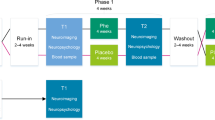Abstract
The Collaborative Study of children treated for phenylketonuria (PKUCS) was conducted to investigate prospectively the effects of dietary restriction of phenylalanine on the growth and development of these children. Patients with classic phenylketonuria were identified by newborn screening and began treatment shortly thereafter. All were given the restricted diet until age 6 years, when half were randomly assigned to continue and half to discontinue dietary therapy. By age 10 years, 35% had deviated from randomization. The effects of diagnostic, treatment, and psychosocial factors on cognitive test scores were evaluated through 12 years of age. After controlling for parent IQ, significant correlations were noted between various measures of control of blood phenylalanine and their scores on intelligence, reading, spelling and behavior tests, but not for arithmetic or language scores. Bender Gestalt test scores were related to phenylalanine level at the time of testing, but not to early treatment history. These findings strongly support the importance of early initiation of dietary treatment and continuation of therapy throughout childhood.
Similar content being viewed by others
Abbreviations
- IDC :
-
index of dietary control
- ITPA :
-
Illinois test of psycholinguistic abilities
- Phe :
-
phenylalanine
- PKU :
-
phenylketonuria
- PKUCS :
-
Collaborative Study of children treated for phenylketonuria
References
Acosta PB, Trahms C, Wellman NS, Williamson M (1983) Phenylalanine intakes of 1 to 6 year old children with phenylketonuria undergoing therapy. Am J Clin Nutr 38:694–700
Azen C, Koch R, Friedman EG, et al (1991) Intellectual development in 12-year-old children treated for phenylketonuria. Am J Dis Child 145:35–39
Fishier K, Azen CG, Henderson R, Friedman EG, Koch R (1987) Psychoeducational findings among children treated for phenylketonuria. Am J Ment Defic 92:65–73
Holtzman NA, Kronmal RA, Doorninck W van, Azen C, Koch R (1986) Effect of age at loss of dietary control on intellectual performance and behavior of children with phenylketonuria. N Engl J Med 314:593–598
Williamson M, Dobson JC, Koch R (1977) Collaborative study of children treated for phenylketonuria: study design. Pediatrics 60:815–821
Williamson ML, Koch R, Azen C, Chang C (1981) Correlates of intelligence test results in treated phenylketonuria children. Pediatrics 68: 161–167
Author information
Authors and Affiliations
Rights and permissions
About this article
Cite this article
Azen, C., Koch, R., Friedman, E. et al. Summary of findings from the United States Collaborative Study of children treated for phenylketonuria. Eur J Pediatr 155 (Suppl 1), S29–S32 (1996). https://doi.org/10.1007/BF03036507
Issue Date:
DOI: https://doi.org/10.1007/BF03036507




